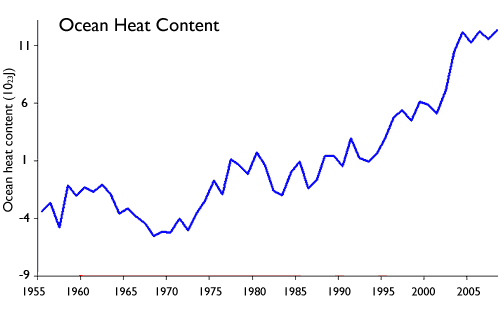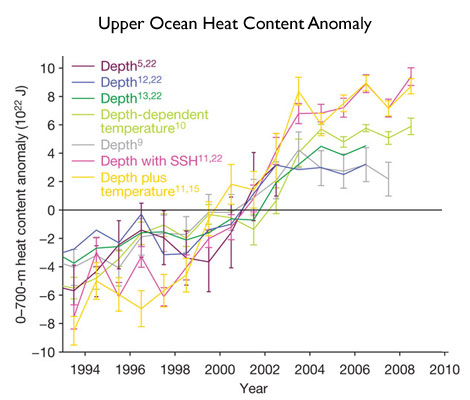Ocean cooling: skeptic arguments drowned by data
Posted on 6 September 2010 by gpwayne
In 2008, climate change sceptic Roger Pielke Sr said this: “Global warming, as diagnosed by upper ocean heat content has not been occurring since 2004”. It is a fine example of denialist spin, making several extraordinary leaps:
- that one symptom is indicative of the state of an entire malaise (e.g. not being short of breath one day means your lung cancer is cured).
- that one can claim significance about a four year period when it’s too short to draw any kind of conclusion
- that global warming has not been occurring on the basis of ocean temperatures alone
So much for the hype. What does the science say about the temperature of the oceans – which, after all, constitute about 70% of the Earth’s surface? The oceans store approximately 80% of all the energy in the Earth’s climate, so ocean temperatures are a key indicator for global warming.
No straight lines
Claims that the ocean has been cooling are correct. Claims that global warming has stopped are not. It is an illogical position: the climate is subject to a lot of natural variability, so the premise that changes should be ‘monotonic’ – temperatures rising in straight lines – ignores the fact that nature doesn’t work like that. This is why scientists normally discuss trends – 30 years or more – so that short term fluctuations can be seen as part of a greater pattern. (Other well-known cyclic phenomena like El Nino and La Nina play a part in these complex interactions).
Looking at the trend in ocean heat, this is what we find:

Source: Levitus 2009
There are, however, disputes about the accuracy of Argo buoys and expendable measuring devices dropped into the sea, and the reporting of temperatures down to only 700 metres. How do scientists resolve these kind of disputes – bearing in mind that such disputes are the very stuff of science, the essence of true scepticism? One way is to find more data sources – different ways of measuring the phenomenon in dispute. By using results from seven different teams of scientists, all using different tools and methods, we are able to see a clear trend. And while there is variation between team results due to the differences in technique and measurement methods, one thing they all agree on: long term, temperatures are going up.

Source: Lyman 2010
The reaction of the oceans to climate change are some of the most profound across the entire environment, including disruption of the ocean food chain through chemical changes caused by CO2, the ability of the sea to absorb CO2 being limited by temperature increases, (and the potential to expel sequestered CO2 back into the atmosphere as the water gets hotter), sea-level rise due to thermal expansion, and the amount of water vapour in the atmosphere.
While there is a great deal we don’t know about how the oceans behave, we do however know that it’s safer to discuss all aspects of climate change using multiple sets of data, rather than just one, as Pielke Sr did. If ocean heat is a guide, then global warming is still on track to cause great disruption if we don’t modify our actions to reduce the release of anthropogenic CO2.
Claims that global warming is not happening on the basis of short-term ocean temperatures are not supported by the evidence.
This post is the Basic version (written by Graham Wayne) of the skeptic argument "Does ocean cooling prove global warming has ended?".































 Arguments
Arguments























 0
0  0
0 The main difference is that the updated version in 2006 starts to diverge from the published OHC reconstruction. Now it is decreasing slightly instead of the former increasing trend. The difference is about -1022 J in less than 2 years.
The main difference is that the updated version in 2006 starts to diverge from the published OHC reconstruction. Now it is decreasing slightly instead of the former increasing trend. The difference is about -1022 J in less than 2 years.
 If it were true, this energy had to come from somewhere. As the oceans have by far the largest heat storage capacity in the climate system, no internal heat reservoir can supply this heat, it can only come from outside. To support this sudden OHC increase, there should have been a transient drop of 6 W/m2 in OLR (Outgoing Longwave Radiation) at TOA (Top of Atmosphere), but nothing like that was seen by satellites.
6 W/m2 is huge and there is no way to miss it. It is equivalent to a 1.6°C drop in the effective temperature of Earth as seen from space.
If it were true, this energy had to come from somewhere. As the oceans have by far the largest heat storage capacity in the climate system, no internal heat reservoir can supply this heat, it can only come from outside. To support this sudden OHC increase, there should have been a transient drop of 6 W/m2 in OLR (Outgoing Longwave Radiation) at TOA (Top of Atmosphere), but nothing like that was seen by satellites.
6 W/m2 is huge and there is no way to miss it. It is equivalent to a 1.6°C drop in the effective temperature of Earth as seen from space.







Comments